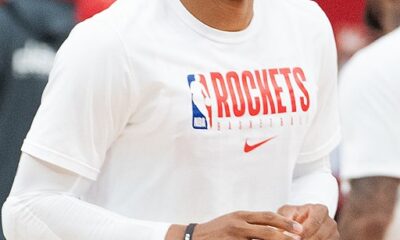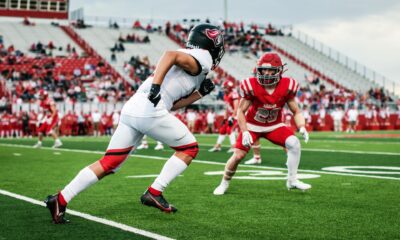All Sports
Educating Your Players on Other Career Options in Professional Sports

Educating Your Players on Other Career Options in Professional Sports
Being a professional athlete is the ultimate dream of so many young people. However, even athletes who were stars in high school and college won’t necessarily “make it.” Even with the right combination of talent and opportunity, things don’t always work out. Timing, injuries, and other factors can prevent players from reaching their full potential and making a living as an athlete.
With this in mind, it’s important for young athletes to have backup plans for their careers. Let’s take a look at why it’s so important to educate your players on alternative career options— and what those options might be.
Why Having a Backup Career Plan is Important for Athletes
So often, a promising young athlete sustains a career-limiting or career-ending injury during a game or practice. At that point, they can’t rely on making a living as a professional athlete. Even if a player is successful for a while, the hard truth is that athletes’ careers are generally short and limited to the amount of time that their bodies can hold up and perform at peak levels.
However, retiring due to injury or age doesn’t have to mean that a player must leave the world of sports altogether. Having a backup plan can mean better financial stability and better mental health after retiring as an athlete. With the risks and instability within the industry as a player, having a backup plan can also provide peace of mind.
Additionally, some players never make it to a professional level but still have a passion for their chosen sport. These players might excel in jobs within the sports industry and get satisfaction from their contributions.
Alternative Career Options in Professional Sports
There are lots of great career options for people with a background in high-level sports. There are opportunities within the industry in management, marketing and PR, coaching, journalism, sports medicine, and more.
Players with a creative side might find that marketing is a good fit for their skills. Creating messaging and content that keeps fans engaged fuels the industry as a whole and can make a huge difference in the popularity of a league or individual team. Or, creating documentaries and other types of media about the sports industry can provide a creative outlet.
Those who want to help guide the future of the sport might like to look into coaching or management. Strong organizational skills and the ability to motivate and teach others are important for these career paths. For sports management, business knowledge and skills are also essential.
Some former players also get into broadcasting or sports journalism. Although they are no longer playing, they can still be involved in the action and enjoy the games from the sidelines.
Other former players find that they are interested in helping current players maintain their health and fitness and end up going into sports medicine. There are many different options within the medical field for those who are interested in sports medicine, from becoming a nurse to pursuing an MD and specializing in orthopedics.
Finally, many former players use their position and fame to start their own businesses or nonprofit organizations. Good examples of this are stars like Magic Johnson and Venus Williams, who have pursued entrepreneurship very successfully.
Practical Steps for Educating Athletes on Career Options
Many athletes don’t put much time and energy into considering their backup or retirement career plans. That’s why it’s so important to educate them on their options and the reasons for making a plan B when it comes to their careers.
Establishing a career development program will help your athletes to take this matter more seriously. Your program might include providing access to career resources, setting up mentorship and networking opportunities, and helping athletes consider the steps they would need to take for different career options.
Additionally, many athletes don’t understand that many of the skills they’ve learned on the court or the field can serve them well in the workforce. Discipline, teamwork, and other skills can easily transfer into a variety of fields. Helping your athletes understand their strengths and how their abilities could be a selling point when looking for a job will help them see themselves in a new light.
Challenges and Obstacles
One of the biggest obstacles that can come up in encouraging your players to consider different career paths is the difficulty in splitting their focus. If they’re actively training to be a professional athlete, then they might not have much time and energy to put into an additional career plan. However, even just getting players to think about what else they might like to do can be helpful.
Another issue can be resistance. Some players don’t want to think that their dream of being a pro athlete might not pan out or might end early. It’s important that you emphasize your belief in them and your support, even as you talk about the need for a solid backup plan.
Diversification is Healthy
All athletes, no matter how far they’ve come in their sport, should have one or two backup career plans, because life is unpredictable. If you want the very best for your players (and of course you do!), then you should ensure that you’re giving them all the support and help they might need.
Diversification, especially in the professional sports industry, is healthy. When a door closes, your players should be ready to open another.
Read more on sports below:
- What is the fastest tennis serve of all time?
- The fastest rugby player ever
- Who are the best penalty takers of all time?
-

 News4 weeks ago
News4 weeks agoThe Best Male Tennis Players of All Time
-

 Football3 weeks ago
Football3 weeks agoPlayers with the most goals in a Premier League season
-

 Football4 weeks ago
Football4 weeks ago10 of the most underrated footballers in the world right now
-

 News3 weeks ago
News3 weeks agoThe Fastest Rugby Players Ever
-

 Football3 weeks ago
Football3 weeks agoChelsea’s Possible Lineup For Next Season
-

 Football3 weeks ago
Football3 weeks agoWho is the Fastest Football Player in the World?
-

 Football3 weeks ago
Football3 weeks agoThe Best Penalty Takers of All Time
-

 Basketball4 weeks ago
Basketball4 weeks agoThe 5 Biggest NBA trades so far this off-season





















